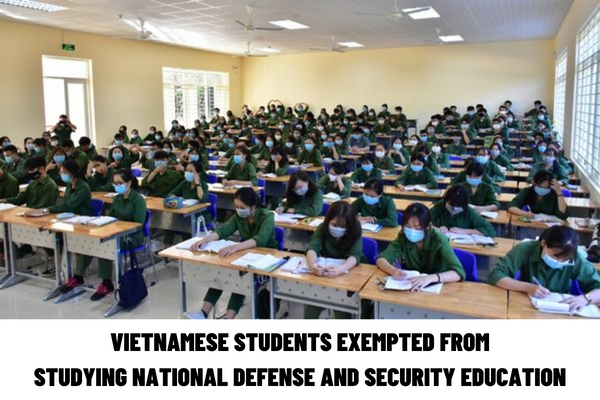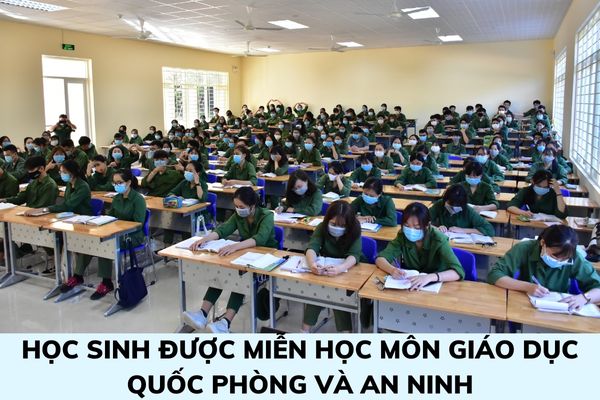When are Vietnamese students exempted from studying National defense and security education? How many classes are there in defense and security education for Vietnamese students?
When are Vietnamese students exempted from studying National defense and security education?
In Article 10 of Circular 22/2021/TT-BGDDT of Vietnam, there are regulations on assessment of Vietnamese students exempted from practice exercises in Physical education and National defense and security education as follows:
Assessment of Vietnamese students exempted from practice exercises in Physical education and National defense and security education
1. Students who face difficulty in learning due to chronic diseases, disabilities, accidents, or diseases that require treatment shall be exempted from practice exercises in Physical education and National defense and security education.
2. Application for exempting practice exercises in Physical education and National defense and security education consists of: Written application of students and medical record or certificates of disabilities issued by hospitals of districts or higher.
3. Exempting practice exercises in Physical education and National defense and security education for illnesses or accidents only apply to a school year; cases of chronic diseases, physical disabilities or prolonged impairment shall apply to all school years or the entire education level. Principals shall allow students to be exempted from practice exercises of Physical education and National defense and security education in each semester or school year.
4. Students who are exempted from Physical education and National defense and security education as per this Article must attend replacement theory examination and/or assessment to maintain sufficient number of examinations and/or assessments as per the law.
Thus, students are exempted from practice exercises in National defense and security education when suffering from chronic diseases, disabilities, accidents, or diseases that require treatment.
Application for exempting practice exercises in National defense and security education consists of: Written application of students and medical record or certificates of disabilities.

When are Vietnamese students exempted from studying National defense and security education? How many classes are there in defense and security education for Vietnamese students? (Image from the Internet)
How many classes are there in defense and security education for Vietnamese students?
In subsection 2, Section VIII, National defense and security education curriculum at high school level, promulgated together with Circular 46/2020/TT-BGDDT of Vietnam stipulating the duration of the curriculum for national defense and security education as follows:
Duration of curriculum
2.1. The duration of the program in classes
The total time for the whole subject is 105 classes, of which: 10th grade: 35 classes, 11th grade: 35 classes, 12th grade: 35 classes. Based on the program of the school year, the educational institutions develop a teaching plan to ensure sufficient time.
2.2. Time spent on educational content
The amount of time for each educational content is arranged by the textbook author and the teacher based on the requirements to be achieved in each class and the actual teaching.
Thus, national defense and security education for students will have a duration of 105 classes for the whole subject, of which: 10th grade: 35 classes, 11th grade: 35 classes, 12th grade: 35 classes.
How to assess the educational results of National defense and security education?
In Section VII of National defense and security education curriculum at high school level enclosed with Circular 46/2020/TT-BGDDT of Vietnam stipulating the assessment of educational results in National defense and security education as follows:
Assessment of educational results
The assessment of the results of National Defense and Security Education is to assess the achievement of students in terms of quality and capacity compared to the requirements to be achieved by each class in order to locate and record progress. each student's set at a certain point in his or her own development; and at the same time provide information for teachers to adjust teaching and educational management agencies to implement program development.
Regarding the form of assessment, it is necessary to combine regular assessment and periodic assessment, between teacher's assessment and student's self-assessment; combination of oral test, written test, practice, research project; combination of assessment by objective test and essay. The assessment of course results should follow the following rules:
1. Regular assessment and periodic assessment
- Regular assessment: Includes formal assessment (through classroom knowledge activities, practice exercises, demonstrations, seminars, etc.) and informal assessment (including observations on class, check old lessons, dialogue, self-assessment, etc.) in order to collect information about the process of forming and developing the quality and capacity of each student.
- Periodic assessment: Organized at the end of the semester and at the end of the school year in the form of objective multiple-choice tests and essay or practice; assessment content focuses on awareness, practical skills; Coordinate with regular assessment to provide information to classify students and adjust educational content and methods.
2. The assessment of the results of the subject of National Defense and Security Education shall comply with the Regulation on assessment and classification of junior high and high school students of the Ministry of Education and Training.
Thus, the assessment of the results of the National Defense and Security Education subject is to assess the achievement of students in terms of quality and capacity compared to the requirements to be met by each class in order to determine the position and record each student's progress at certain points in his or her development.
LawNet
